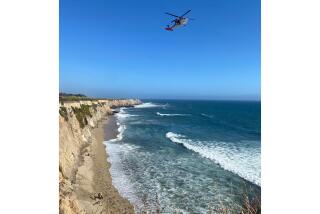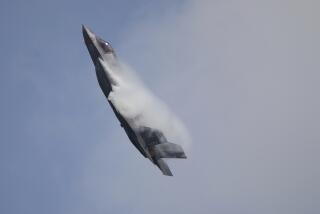Radio Fan Saves Ship From Waves : Encino Ham Operator Praised for Helping Rescue People on Grounded Yacht a Continent Away
- Share via
As an amateur radio operator, Bob Karon has frequent conversations around the world, swapping stories about family, sports or new radio equipment with other enthusiasts.
But a recent transmission, heard as he was testing a new amplifier, sent the 46-year-old Encino ham operator leaping to his feet: a frantic voice calling “Mayday! Mayday!”
Within seconds he had begun a search by radio and telephone that, with the assistance of the U.S. Coast Guard, ended in the rescue of four people aboard a yacht sinking in the Caribbean Sea at night with a storm moving in.
“This all came out of the blue,” he said this week after receiving a letter of commendation from the Coast Guard. “I wasn’t expecting an emergency call.”
The night of March 18, he was speaking with another ham operator in Naples, Fla., when he heard the mayday call on the same frequency.
In the first few minutes of talking to the sinking craft, Karon found out that it was a 44-foot Canadian yacht named the Cambria, carrying owner Kenneth Cunningham, his wife and another couple.
The yacht had been grounded on a reef about 150 miles southwest of Jamaica, Cunningham indicated in static-interrupted transmissions.
The yacht had a hole in it and water was coming in fast. A storm was approaching. The waves were growing. Cunningham said the boat would go under within the hour.
“They sounded terrified,” Karon said. “It sounded like they had very little time.”
Karon first telephoned the Coast Guard in Los Angeles, and was transferred to the Miami station. Phone to his ear and microphone in hand, Karon was the only link between Cunningham and potential rescuers.
“I had to make sure [the Coast Guard and the sailors] got absolutely correct information” about the yacht and its location, Karon said.
That turned out to be very difficult.
The grounding left the vessel on its side on the reef and jolted the communications system out of place, including the radio antenna, which was almost touching the water, Cunningham told Karon.
The signal was weak and full of static, Karon said.
“A lot of times I would say something and the response would come back, ‘Negative,’ ” Karon said, meaning Cunningham was trying to correct him.
The Coast Guard determined that its closest rescue team was 2 1/2 hours away. But the Nord-Jahre-President a freighter, was about 25 miles away and could reach the Cambria in an hour and a half. It might be too late, Cunningham told Karon, but it was their best chance.
Karon was connected by the Coast Guard to the Nord-Jahre, which accepted the mission, changed course toward the Cambria, and took over from Karon, who learned the rest of the story when he got the letter from the Coast Guard.
Shallow waters had prevented the ship from reaching the grounded yacht, but the freighter’s crew sent a lifeboat that rescued Cunningham and passengers just as the storm broke around 2 a.m. The freighter took them to Aruba.
“Your professional and humanitarian actions are heartily commended and demonstrate the finest traditions of assisting mariners in distress,” said Coast Guard Capt. Robert Gravino in his letter to Karon.
“This is the first time that I know of that someone picked up the call before the Coast Guard,” added Petty Officer Scott Carr, who aided in the rescue from the Miami station.
Efforts to locate Cunningham and his crew on Wednesday were unsuccessful. The Coast Guard said Cunningham managed to salvage his yacht and get it patched up. He and his crew might have gone back to sea, Carr said.
“Their next port of call was Livingston, Guatemala,” he said.
More to Read
Sign up for Essential California
The most important California stories and recommendations in your inbox every morning.
You may occasionally receive promotional content from the Los Angeles Times.










